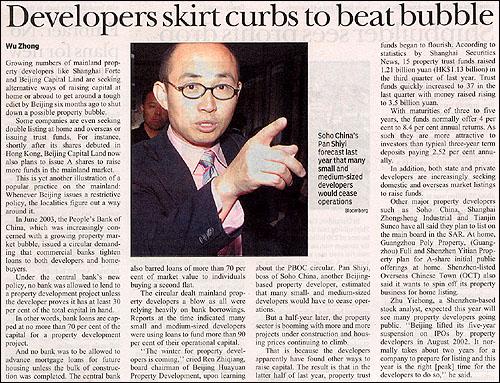
Growing numbers of mainland property developers like Shanghai Forte and Beijing Capital Land are seeking alternative ways of raising capital at home or abroad to get around a tough edict by Beijing six months ago to shut down a possible property bubble.
Some companies are even seeking double listing at home and overseas or issuing trust funds. For instance, shortly after its shares debuted in Hong Kong, Beijing Capital Land now also plans to issue A shares to raise more funds in the mainland market.
This is yet another illustration of a popular practice on the mainland: Whenever Beijing issues a restrictive policy, the localities figure out a way around it.
In June 2003, the People's Bank of China, which was increasingly concerned with a growing property market bubble, issued a circular demanding that commercial banks tighten loans to both developers and homebuyers. Under the central bank's new policy, no bank was allowed to lend to a property development project unless the developer proves it has at least 30 per cent of the total capital in hand.
In other words, bank loans are capped at no more than 70 per cent of the capital for a property development project.
And no bank was to be allowed to advance mortgage loans for future housing unless the bulk of construction was completed. The central bank also barred loans of more than 70 per cent of market value to individuals buying a second flat.
The circular dealt mainland property developers a blow as all were relying heavily on bank borrowings. Reports at the time indicated many small and medium-sized developers were using loans to fund more than 90 per cent of their operational capital.
"The winter for property developers is coming," cried Ren Zhiqiang, board chairman of Beijing Huayuan Property Development, upon learning about the PBOC circular. Pan Shiyi, boss of Soho China, another Beijing-based property developer, estimated that many small- and medium-sized developers would have to cease operations.
But a half-year later, the property sector is booming with more and more projects under construction and housing prices continuing to climb.
That is because the developers apparently have found other ways to raise capital. The result is that in the latter half of last year, property trust funds began to flourish. According to statistics by Shanghai Securities News, 15 property trust funds raised 1.21 billion yuan (HK$1.13 billion) in the third quarter of last year. Trust funds quickly increased to 37 in the last quarter with money raised rising to 3.5 billion yuan.
With maturities of three to five years, the funds normally offer 4 per cent to 8.4 per cent annual returns. As such they are more attractive to investors than typical three-year term deposits paying 2.52 per cent annually.
In addition, both state and private developers are increasingly seeking domestic and overseas market listings to raise funds.
Other major property developers such as Soho China, Shanghai Zhongsheng Industrial and Tianjin Sunco have all said they plan to list on the main board in the SAR. At home, Guangzhou Poly Property, (Guangzhou) Fuli and Shenzhen Yitian Property plan for A-share initial public offerings at home. Shenzhen-listed Overseas Chinese Town (OCT) also said it wants to spin off its property business for home listing.
Zhu Yiehong, a Shenzhen-based stock analyst, expected this year will see many property developers going public. "Beijing lifted its five-year suspension on IPOs by property developers in August 2002. It normally takes about two years for a company to prepare for listing and this year is the right [peak] time for the developers to do so," he said.





